You are using an out of date browser. It may not display this or other websites correctly.
You should upgrade or use an alternative browser.
You should upgrade or use an alternative browser.
Flaming Dragons-A Warlord China Alternate History
- Thread starter tukk323
- Start date
12. Once Upon A Time In Manchuria.
9 March 1931
Xingshan Township, Kirin Province
Manchuria
Republic of China
(Manchukuo, as recognised by Japan)
The last Japanese soldier fell down dead next to his compatriots, his body riddled with bullets. Tang Juwu ordered his men to cease firing the precious M1917 heavy machine gun. He ordered them to pack up the gun and get ready to move out, this town had been cleared, but they had much work to do.
“Thank you general” said the leader of the town “we are eternally grateful to you.”
Tang nodded, this man had lost his entire family to the brutal Japanese soldiers that had occupied his town, killing them had been the least he could for him.
“Make sure you are ready to defend yourselves if you have to” said Tang “but don’t try to provoke them too much. If you do, they’ll send in an entire unit to wipe out the town, hopefully though we’ll be keeping them busy. Alright, set the bodies alight and get ready to move out, we’ve got work to do elsewhere.”
One of Tang’s scouts came up while they were moving the bodies into a pile.
“Sir the Japanese are sending a brigade past the river, it should be passing south in the next half hour.”
Tang smiled “Excellent, we’ll show these bastards they can’t do what they like in our country.” Tang began giving orders to move towards the river and set up an ambush for the Japanese brigade. He hoped this would be the first of many steps towards threatening Mukden.
Taken from Tang Juwu: The Hero of Manchuria, by Chen Jisheng, © 1985 Dragon Breath Publishing House, Shanghai, Republic of China, Translated to English by Carl Hamilton
Chapter 2.
Tang’s service time in the army since 1915 had taught him discipline, honour and most importantly loyalty. The disbanding of his regiment in the aftermath of the Japanese invasion left him grieving for his homeland until he escaped internment.
The deplorable conditions in the prison camp were harsh and many the Japanese guards were brutal to anyone who stepped out of line. Tang kept himself out of trouble for one week and waited for the Japanese to drop their guard.
On the night of November 18 an opportunity presented itself. Tang had noted that certain parts of the camp went unwatched for some time as the guards deemed those areas unimportant. When he was coming back from the outhouse he stabbed a soldier in the neck with a sharpened piece of wood and strangled another with wire. Thus he was able to make it to the unwatched sections without anyone hearing anything. He quickly made his way over the fence and was a mile away before anyone at the camp became suspicious.
Tang met up with other soldiers that avoided internment or had hidden and he was appointed commander of the Anti-Japanese Resistance Army, which he built up with his extensive contacts throughout north east Manchuria. This army comprised of former soldiers, bandits, militias and self defence peasant groups. By the time Tang decided to go on the offensive his army was 30,000 strong. In June of 1931 Tang led his army into Liaoning from the north east and engaged the Kwangtung Army garrison at Fushun. He beat back the Japanese forces and continued advancing west until he army was savaged at Dengta, by several Japanese and Manchukuo brigades. After this he turned his army towards the guerrilla warfare for which he became famous for, to both the Chinese public and the infuriated Japanese commanders that tired to capture him and his men.
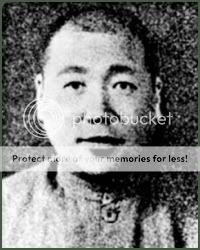
Tang Juwu
From “A Tour Of International Cinema, Part 12”, by Kevin Raines, © July 1990, American Journal of Motion Picture, Volume 37, California Film Centre, Los Angeles, USA
Dumpling Westerns.
The name Dumpling Western was first coined to describe director Chang Cheh’s [1] film The Lone Soldier, about the guerrilla war led by Tang Juwu, which was not the most historically accurate film and made Tang out to be more of a folk hero than a disciplined soldier, but it did well nonetheless and with it came a surge of Chinese films set in the same period. The film depicted Tang during his time before he formed his large guerrilla army and saving a small town from a garrison of Japanese soldiers intent on ruling over it. The inaccuracies are fairly obvious, no group of Japanese soldiers ever set themselves up as rulers of a Manchurian town and Tang only spent a few weeks in the wilderness before meeting with the leaders of the Manchurian rebellion, doubtful he would have had time to have saved a town. But Chang took much inspiration from the Western genre and much as the Italian made Spaghetti Westerns his film was dubbed a ‘Dumpling Western’ and would be followed by several more. This would soon follow with a slew of Dumpling Westerns being made in Shanghai and Hong Kong, with many of them becoming the second major Chinese genre to make it to American and European theatres after kung fu films.
The Lone Soldier also ignited the early careers of several actors who would continue in Dumpling Westerns and become famous for them, as well as branching into the more traditional Chinese stories of wuxia [2].
The important difference between Spaghetti and Dumpling Westerns is that the Italian ones were still set in the American West and Mexico while the Chinese films have a Chinese setting and this distinction has become clear over time. Spaghetti Westerns tended to die off around the early 1980s, though many are still revered today, as Italian cinema changed course away from westerns. But Dumpling Westerns maintained a strong presence in China and in the United States, this was likely due to the fact that several prominent American directors tried their hand at a Dumpling Western and several of them went on to have great success at the box office, Stanley Kubrick’s Fire On The Yangtze River being the most widely known and watched.
Today Dumpling Westerns still enjoy a strong market in China and any Chinese historical film from set roughly in the period 1911-1940 with a certain style is considered to be a Dumpling Western.

Actors from The Lone Soldier who became famous in the Dumpling Western genre; left to right, Zheng Pei-pei, Cheung Ying Choi and John Wang.
Notable Dumpling Westerns (in order of release)
The Lone Soldier (1965)
Gold Lust (1966)
Bandits, Bullets and Beans (1966)
Wayward Cause (1968)
Race To Wu’s Treasure (1968)
The Horseman and the Thief (1969)
In the Shadow of the Mountain (1970)
1001 Thieves (1970)
Showdown in Arun (1971)
Gunman Jiaxing (1972)
Bounty’s Rest (1972)
Drifting Through Liaoning (1973)
Land of Loss (1974)
The Road To Shanghai (1975)
Where the Soldiers Won’t Go (1976)
Seven Man Army (1976) [3]
Bullets Don’t Lie (1978)
Cold Heart (1980)
Warlord Zhou (1981)
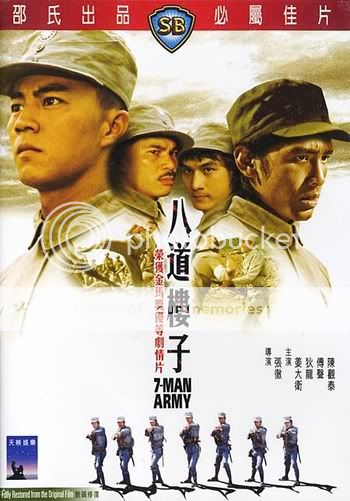

Posters from some Dumpling Westerns
[1] Chang was one of the most famous and prolific directors of Hong Kong cinema and Shaw Brother’s Studio, much of his work OTL was influenced by spaghetti westerns, so here he has simply taken that inspiration one step further and created a new type of western.
[2] Chinese historical martial arts films.
[3] Similar to the OTL film of the same name but with differences like being set in the Battle of Shanghai of 1931 rather than in the defence of the Great Wall and more of a Western style to it.
9 March 1931
Xingshan Township, Kirin Province
Manchuria
Republic of China
(Manchukuo, as recognised by Japan)
The last Japanese soldier fell down dead next to his compatriots, his body riddled with bullets. Tang Juwu ordered his men to cease firing the precious M1917 heavy machine gun. He ordered them to pack up the gun and get ready to move out, this town had been cleared, but they had much work to do.
“Thank you general” said the leader of the town “we are eternally grateful to you.”
Tang nodded, this man had lost his entire family to the brutal Japanese soldiers that had occupied his town, killing them had been the least he could for him.
“Make sure you are ready to defend yourselves if you have to” said Tang “but don’t try to provoke them too much. If you do, they’ll send in an entire unit to wipe out the town, hopefully though we’ll be keeping them busy. Alright, set the bodies alight and get ready to move out, we’ve got work to do elsewhere.”
One of Tang’s scouts came up while they were moving the bodies into a pile.
“Sir the Japanese are sending a brigade past the river, it should be passing south in the next half hour.”
Tang smiled “Excellent, we’ll show these bastards they can’t do what they like in our country.” Tang began giving orders to move towards the river and set up an ambush for the Japanese brigade. He hoped this would be the first of many steps towards threatening Mukden.
Taken from Tang Juwu: The Hero of Manchuria, by Chen Jisheng, © 1985 Dragon Breath Publishing House, Shanghai, Republic of China, Translated to English by Carl Hamilton
Chapter 2.
Tang’s service time in the army since 1915 had taught him discipline, honour and most importantly loyalty. The disbanding of his regiment in the aftermath of the Japanese invasion left him grieving for his homeland until he escaped internment.
The deplorable conditions in the prison camp were harsh and many the Japanese guards were brutal to anyone who stepped out of line. Tang kept himself out of trouble for one week and waited for the Japanese to drop their guard.
On the night of November 18 an opportunity presented itself. Tang had noted that certain parts of the camp went unwatched for some time as the guards deemed those areas unimportant. When he was coming back from the outhouse he stabbed a soldier in the neck with a sharpened piece of wood and strangled another with wire. Thus he was able to make it to the unwatched sections without anyone hearing anything. He quickly made his way over the fence and was a mile away before anyone at the camp became suspicious.
Tang met up with other soldiers that avoided internment or had hidden and he was appointed commander of the Anti-Japanese Resistance Army, which he built up with his extensive contacts throughout north east Manchuria. This army comprised of former soldiers, bandits, militias and self defence peasant groups. By the time Tang decided to go on the offensive his army was 30,000 strong. In June of 1931 Tang led his army into Liaoning from the north east and engaged the Kwangtung Army garrison at Fushun. He beat back the Japanese forces and continued advancing west until he army was savaged at Dengta, by several Japanese and Manchukuo brigades. After this he turned his army towards the guerrilla warfare for which he became famous for, to both the Chinese public and the infuriated Japanese commanders that tired to capture him and his men.

Tang Juwu
From “A Tour Of International Cinema, Part 12”, by Kevin Raines, © July 1990, American Journal of Motion Picture, Volume 37, California Film Centre, Los Angeles, USA
Dumpling Westerns.
The name Dumpling Western was first coined to describe director Chang Cheh’s [1] film The Lone Soldier, about the guerrilla war led by Tang Juwu, which was not the most historically accurate film and made Tang out to be more of a folk hero than a disciplined soldier, but it did well nonetheless and with it came a surge of Chinese films set in the same period. The film depicted Tang during his time before he formed his large guerrilla army and saving a small town from a garrison of Japanese soldiers intent on ruling over it. The inaccuracies are fairly obvious, no group of Japanese soldiers ever set themselves up as rulers of a Manchurian town and Tang only spent a few weeks in the wilderness before meeting with the leaders of the Manchurian rebellion, doubtful he would have had time to have saved a town. But Chang took much inspiration from the Western genre and much as the Italian made Spaghetti Westerns his film was dubbed a ‘Dumpling Western’ and would be followed by several more. This would soon follow with a slew of Dumpling Westerns being made in Shanghai and Hong Kong, with many of them becoming the second major Chinese genre to make it to American and European theatres after kung fu films.
The Lone Soldier also ignited the early careers of several actors who would continue in Dumpling Westerns and become famous for them, as well as branching into the more traditional Chinese stories of wuxia [2].
The important difference between Spaghetti and Dumpling Westerns is that the Italian ones were still set in the American West and Mexico while the Chinese films have a Chinese setting and this distinction has become clear over time. Spaghetti Westerns tended to die off around the early 1980s, though many are still revered today, as Italian cinema changed course away from westerns. But Dumpling Westerns maintained a strong presence in China and in the United States, this was likely due to the fact that several prominent American directors tried their hand at a Dumpling Western and several of them went on to have great success at the box office, Stanley Kubrick’s Fire On The Yangtze River being the most widely known and watched.
Today Dumpling Westerns still enjoy a strong market in China and any Chinese historical film from set roughly in the period 1911-1940 with a certain style is considered to be a Dumpling Western.

Actors from The Lone Soldier who became famous in the Dumpling Western genre; left to right, Zheng Pei-pei, Cheung Ying Choi and John Wang.
Notable Dumpling Westerns (in order of release)
The Lone Soldier (1965)
Gold Lust (1966)
Bandits, Bullets and Beans (1966)
Wayward Cause (1968)
Race To Wu’s Treasure (1968)
The Horseman and the Thief (1969)
In the Shadow of the Mountain (1970)
1001 Thieves (1970)
Showdown in Arun (1971)
Gunman Jiaxing (1972)
Bounty’s Rest (1972)
Drifting Through Liaoning (1973)
Land of Loss (1974)
The Road To Shanghai (1975)
Where the Soldiers Won’t Go (1976)
Seven Man Army (1976) [3]
Bullets Don’t Lie (1978)
Cold Heart (1980)
Warlord Zhou (1981)


Posters from some Dumpling Westerns
[1] Chang was one of the most famous and prolific directors of Hong Kong cinema and Shaw Brother’s Studio, much of his work OTL was influenced by spaghetti westerns, so here he has simply taken that inspiration one step further and created a new type of western.
[2] Chinese historical martial arts films.
[3] Similar to the OTL film of the same name but with differences like being set in the Battle of Shanghai of 1931 rather than in the defence of the Great Wall and more of a Western style to it.
Last edited:
yes, this is a bump. But it's a productive bump. 
Mr. tukk323, I was reading over this timeline while researching for my own (brief info is in my sig, basically the POD takes place a year earlier than yours. It's interesting because the man responsible for changing everything in your TL, "Xu Chu", was the cousin of general Xu Chongzhi, the man responsible for changing everything in OTL of GMD leader ZK Liao. Now, I'm wondering -- where did you find information about Xu Chu? Could you post or PM me a link of your research sources?
This is just a request - I managed to find this one source which seems a bit... biased. So I'd be interested to see what you came up with - Xu Chu seems to be a very hard man to find...
Mr. tukk323, I was reading over this timeline while researching for my own (brief info is in my sig, basically the POD takes place a year earlier than yours. It's interesting because the man responsible for changing everything in your TL, "Xu Chu", was the cousin of general Xu Chongzhi, the man responsible for changing everything in OTL of GMD leader ZK Liao. Now, I'm wondering -- where did you find information about Xu Chu? Could you post or PM me a link of your research sources?
This is just a request - I managed to find this one source which seems a bit... biased. So I'd be interested to see what you came up with - Xu Chu seems to be a very hard man to find...
yes, this is a bump. But it's a productive bump.
Mr. tukk323, I was reading over this timeline while researching for my own (brief info is in my sig, basically the POD takes place a year earlier than yours. It's interesting because the man responsible for changing everything in your TL, "Xu Chu", was the cousin of general Xu Chongzhi, the man responsible for changing everything in OTL of GMD leader ZK Liao. Now, I'm wondering -- where did you find information about Xu Chu? Could you post or PM me a link of your research sources?
This is just a request - I managed to find this one source which seems a bit... biased. So I'd be interested to see what you came up with - Xu Chu seems to be a very hard man to find...
I first heard about the assassination attempt in Jonathan Fenby's Chiang Kai-Shek biography, but it was lacking details, which i found in the same pdf link you mentioned. Other than the assassination I don't know anything about him, it was simply a convenient POD, and I still killed him off, so that I didn't need to dig any deeper, sorry I couldn't be of more help. A Liao China will certainly be different from OTL and from mine, sounds good.
Work and life been bus for writing, but a relaxing holiday in my hometown in a few days may give me some time to get some actual posts done as opposed to just notes
13. Brotherhood Of Resistance.
From ‘The Complete Second World War, Volume 1: The Opening Moves, From Manchuria to Yugoslavia’
By Robert Keegan
© 1985, Coleman Publishing Group, St Louis, USA
The main armies of the NRA had finally been forced to pull back from Manchuria in early 1932 and the Chinese government decided to abandon its policy of direct engagement, as there were other pressing issues including a long overdue fixing of the economy and the resurgence of the communists. In fact there was some decision that allowing the Japanese to temporarily have Manchuria may in fact wipe out the difficult to remove communist guerrillas under Mao.
While the decision to do this was not politically easy, given the public’s anti-Japanese stance, it was done in such a way as to portray the government as still fighting without actually carrying out military operations. Many advisors and supplies were sent to aid the ‘freedom armies’ which had formed in the wake of the invasion (dubbed as ‘bandits’ by the IJA)
Japan meanwhile was trying to ease its conquest and occupation by creating the new nation of Manchukuo, under the Manchu heir Henry Puyi, though it was not recognised by any other nations [1].
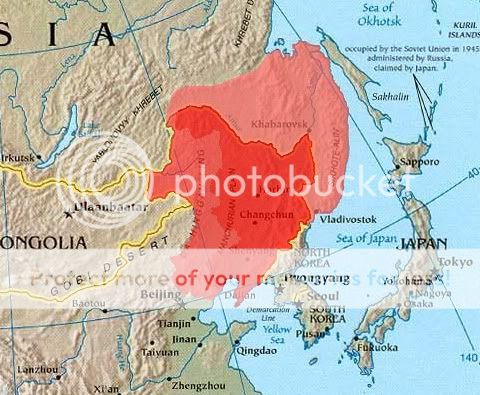
Manchuria, with the dark red showing the initial territory of Manchukuo.
The Jilin and Liaoning provinces were the most important areas where the resistance operated, in Jilin General Ting Chao was operating his Jilin Self-Defence Army, which managed to hold Harbin form three major assaults by Japanese and Manchukuoan troops, until they were finally forced to abandon the city and spread out into the countryside, several resistance armies operated here for the next three years under Ting and generals, Li Du, Feng Zhanhai and Wang Delin as the harassed the IJA between Harbin and the Soviet border. In the northwest the cavalry general Ma Zhanshan, who had at first joined Manchukuo and Japan only to betray them and seize arms and supplies to use against them caused so much trouble, including attacking Changchun in November of 1931 that the Japanese concentrated their forces there giving the other generals a free hand.
After several fierce battles in the summer of 1932, Ma’s forces were finally forced into retreat and he was captured near the town of Jiwen along with several thousand of his men. The remainder of them escaped to the Soviet Union or fled west, some of them joining the communist resistance. Ma had forced three times as many men as he had to chase him for more than a year and Ting’s armies made good use of this, establishing themselves throughout most of the small towns in the north east and they held out until 1934, when the Japanese finally brought in overwhelming numbers to defeat them, though many continued to operate in very small units and many of the generals managed to make their way south to Chinese controlled territory.
Further south in Liaoning, General Tang Juwu led an incredible guerrilla campaign, and his forces swelled with volunteers, including some Korean resistance members led by future politician Kim Il-Sung. This further delayed the Japanese operations against the NRA and the Jilin Army and the Japanese were continually frustrated by Tang’s elusiveness. In fact he became so troublesome that IJA intelligence officer, Colonel Kenji Doihara put up a $1,000,000 sum in gold for his capture or death [2].
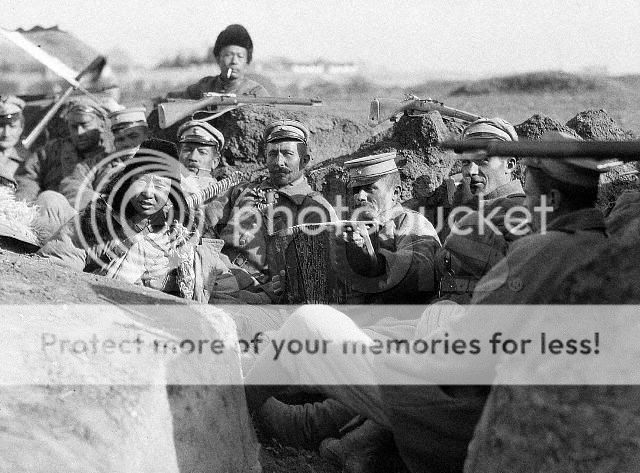
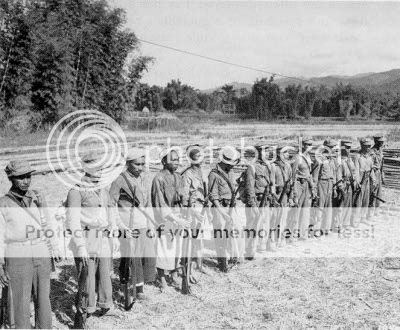
Resistance fighters in Manchuria
Imperial Japan’s Folly: Invading China, By Marco Bravelli, English translation by Antonio Grimani © 1978, Gravello Publishing House-Kingdom of Italy, Nice
The Imperial Army’s impressive war machine, which had done an incredible job at taking Manchuria, was however not quite as capable as holding the territory which it had captured. Continual resistance in the north-west plagued the Japanese and the Kwangtung forces were still fighting some active NRA units west of Liaoning. The Chinese government had stepped back from direct engagement and limited itself to defence in the south while continuing to ship advisors and supplies into Manchuria.
After finally destroying many of the larger bandit armies, the IJA was ready to expand Manchukuo to ensure that support to the remaining resistance was cut off. To this end, the overall commander of the Kwantung Army, Baron Shigeru Honjo [3], decided to seize Rehe province from the Kuomintang government in order to seal off Manchuria.
4 May 1933
Rehe Province
Republic of China
A scan of the horizon revealed, small wisps of dust and smoke from the approaching army. The observer put down the binoculars and handed them back to Zhang Xueliang, they had originally belonged to his father, a gift from a Japanese nobleman before they had decided to invade China.
“Well?” asked Zhang.
“No doubt about it sir, the Japanese have finally decided to come west.”
Zhang simply nodded in acknowledgement. He turned his head to his officers.
“I’m not going to lie to any of you, we’re in for one hell of a fight. They may have been savaged over the last few years by the brave men in the north, but they wouldn’t come unless they were fairly confident of taking the province. The president wants us to stand here and I intend to do so. Whether we win or lose it has been an honour serving with each of you. You have all shown incredible dedication and patriotism in this war. I can only pray to Heaven that this will be the last battle of it. Luck by with you all.”
And with that his men gave a cheer and saluted him.
The Japanese attacked near dawn the next day. They had seized the small towns in the east of the province first and then proceed on a south-west direction towards the Great Wall and Zhang intended on stopping them from reaching it.
He had positioned his army in and around Changde. Zhang commanded his forces from the city hall in the south of the metropolitan district as the Japanese advanced up towards the city, their constant artillery fire ravaging the buildings and defences.
After two days the Japanese had reached the edge of the city and Zhang was getting reports of lines being broken. He had just ordered the bulk of his forces back into the city when an aide ran up and delivered him an intelligence message.
Further Japanese reinforcements were arriving from the north-about two divisions.
He crumpled the paper in frustration and placed his hands on the table, closing his eyes and calming his thoughts. Two more divisions was too much, there were barely holding on as it was, the Japanese were going to crush them. Perhaps it was finally time to surrender and ask for terms?
No, it was too soon, how could look at his men in the face after surrendering so quickly. He would fight until the city was no longer defendable and only then surrender.
The next day, fully expecting the Japanese reinforcements to begin penetrating the north he was surprised to get reports of Chinese troops marching in from the north instead! He couldn’t get a clear message so he decided to find out what was going on in person and ran down to his car.
“Drive north Wu!” he said “I need to know what is happening”.
His driver nodded and made the journey as quickly as he could reaching the northern outskirts within twenty minutes.
Zhang got out of the vehicle and approached one of his Tang Yelin, who was conversing with several others, poorly dressed, but tough looking individuals.
“What is going on?” asked Zhang.
“General, sir!” said Tang, this Wang Delin and Feng Zhanhai. They bring a message from General Tang Juwu.”
Wang said “General Tang says do not worry, the Japanese reinforcements have been dealt with and it is Changde which will be receiving reinforcement, from the Anti-Japanese Brotherhood Army”
Zhang looked at them in amazement “You’re still out there fighting!”
“Yes” replied Wang “and the Japanese made a fatal mistake in ignoring us to attack you. Tang has a trap ready fro the Japanese in the east, he is simply waiting for them to spring it with a little help from us of course.”
Zhang nodded and smiled “This is wonderful. Of course, if Tang has a plan then let me hear it and after this battle I must invite him to have a drink with me!”
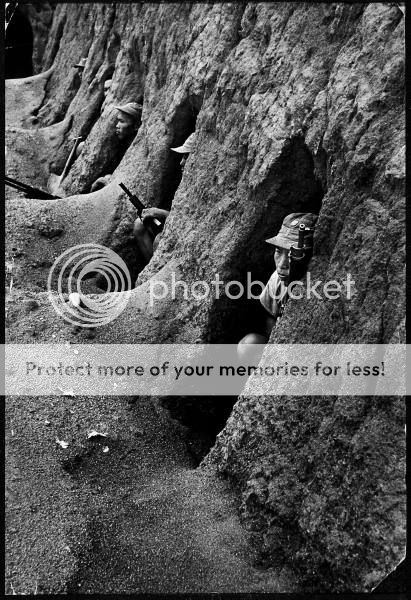
Soldiers from Tang Juwu’s army, waiting to ambush the Japanese
[1] At its creation it was not, but within a few years, El Salvador, the Dominican Republic, Italy and the Soviet Union gave defacto diplomatic recognition to Manchukuo, despite the official League of Nations declaration that Manchuria was rightfully part of China.
[2] If this seems outrageously large, in OTL Doihara made a $3,000,000 offer to General Ma to defect from the resistance to Manchukuo due to his fame.
[3] Honjo was put in command slightly later than OTL, Hishikari was not replaced until after his failure to crack down on the resistance, and he remains in command rather than being relieved for insubordination due to his connections to Prime Minister Araki.
From ‘The Complete Second World War, Volume 1: The Opening Moves, From Manchuria to Yugoslavia’
By Robert Keegan
© 1985, Coleman Publishing Group, St Louis, USA
The main armies of the NRA had finally been forced to pull back from Manchuria in early 1932 and the Chinese government decided to abandon its policy of direct engagement, as there were other pressing issues including a long overdue fixing of the economy and the resurgence of the communists. In fact there was some decision that allowing the Japanese to temporarily have Manchuria may in fact wipe out the difficult to remove communist guerrillas under Mao.
While the decision to do this was not politically easy, given the public’s anti-Japanese stance, it was done in such a way as to portray the government as still fighting without actually carrying out military operations. Many advisors and supplies were sent to aid the ‘freedom armies’ which had formed in the wake of the invasion (dubbed as ‘bandits’ by the IJA)
Japan meanwhile was trying to ease its conquest and occupation by creating the new nation of Manchukuo, under the Manchu heir Henry Puyi, though it was not recognised by any other nations [1].

Manchuria, with the dark red showing the initial territory of Manchukuo.
The Jilin and Liaoning provinces were the most important areas where the resistance operated, in Jilin General Ting Chao was operating his Jilin Self-Defence Army, which managed to hold Harbin form three major assaults by Japanese and Manchukuoan troops, until they were finally forced to abandon the city and spread out into the countryside, several resistance armies operated here for the next three years under Ting and generals, Li Du, Feng Zhanhai and Wang Delin as the harassed the IJA between Harbin and the Soviet border. In the northwest the cavalry general Ma Zhanshan, who had at first joined Manchukuo and Japan only to betray them and seize arms and supplies to use against them caused so much trouble, including attacking Changchun in November of 1931 that the Japanese concentrated their forces there giving the other generals a free hand.
After several fierce battles in the summer of 1932, Ma’s forces were finally forced into retreat and he was captured near the town of Jiwen along with several thousand of his men. The remainder of them escaped to the Soviet Union or fled west, some of them joining the communist resistance. Ma had forced three times as many men as he had to chase him for more than a year and Ting’s armies made good use of this, establishing themselves throughout most of the small towns in the north east and they held out until 1934, when the Japanese finally brought in overwhelming numbers to defeat them, though many continued to operate in very small units and many of the generals managed to make their way south to Chinese controlled territory.
Further south in Liaoning, General Tang Juwu led an incredible guerrilla campaign, and his forces swelled with volunteers, including some Korean resistance members led by future politician Kim Il-Sung. This further delayed the Japanese operations against the NRA and the Jilin Army and the Japanese were continually frustrated by Tang’s elusiveness. In fact he became so troublesome that IJA intelligence officer, Colonel Kenji Doihara put up a $1,000,000 sum in gold for his capture or death [2].


Resistance fighters in Manchuria
Imperial Japan’s Folly: Invading China, By Marco Bravelli, English translation by Antonio Grimani © 1978, Gravello Publishing House-Kingdom of Italy, Nice
The Imperial Army’s impressive war machine, which had done an incredible job at taking Manchuria, was however not quite as capable as holding the territory which it had captured. Continual resistance in the north-west plagued the Japanese and the Kwangtung forces were still fighting some active NRA units west of Liaoning. The Chinese government had stepped back from direct engagement and limited itself to defence in the south while continuing to ship advisors and supplies into Manchuria.
After finally destroying many of the larger bandit armies, the IJA was ready to expand Manchukuo to ensure that support to the remaining resistance was cut off. To this end, the overall commander of the Kwantung Army, Baron Shigeru Honjo [3], decided to seize Rehe province from the Kuomintang government in order to seal off Manchuria.
4 May 1933
Rehe Province
Republic of China
A scan of the horizon revealed, small wisps of dust and smoke from the approaching army. The observer put down the binoculars and handed them back to Zhang Xueliang, they had originally belonged to his father, a gift from a Japanese nobleman before they had decided to invade China.
“Well?” asked Zhang.
“No doubt about it sir, the Japanese have finally decided to come west.”
Zhang simply nodded in acknowledgement. He turned his head to his officers.
“I’m not going to lie to any of you, we’re in for one hell of a fight. They may have been savaged over the last few years by the brave men in the north, but they wouldn’t come unless they were fairly confident of taking the province. The president wants us to stand here and I intend to do so. Whether we win or lose it has been an honour serving with each of you. You have all shown incredible dedication and patriotism in this war. I can only pray to Heaven that this will be the last battle of it. Luck by with you all.”
And with that his men gave a cheer and saluted him.
The Japanese attacked near dawn the next day. They had seized the small towns in the east of the province first and then proceed on a south-west direction towards the Great Wall and Zhang intended on stopping them from reaching it.
He had positioned his army in and around Changde. Zhang commanded his forces from the city hall in the south of the metropolitan district as the Japanese advanced up towards the city, their constant artillery fire ravaging the buildings and defences.
After two days the Japanese had reached the edge of the city and Zhang was getting reports of lines being broken. He had just ordered the bulk of his forces back into the city when an aide ran up and delivered him an intelligence message.
Further Japanese reinforcements were arriving from the north-about two divisions.
He crumpled the paper in frustration and placed his hands on the table, closing his eyes and calming his thoughts. Two more divisions was too much, there were barely holding on as it was, the Japanese were going to crush them. Perhaps it was finally time to surrender and ask for terms?
No, it was too soon, how could look at his men in the face after surrendering so quickly. He would fight until the city was no longer defendable and only then surrender.
The next day, fully expecting the Japanese reinforcements to begin penetrating the north he was surprised to get reports of Chinese troops marching in from the north instead! He couldn’t get a clear message so he decided to find out what was going on in person and ran down to his car.
“Drive north Wu!” he said “I need to know what is happening”.
His driver nodded and made the journey as quickly as he could reaching the northern outskirts within twenty minutes.
Zhang got out of the vehicle and approached one of his Tang Yelin, who was conversing with several others, poorly dressed, but tough looking individuals.
“What is going on?” asked Zhang.
“General, sir!” said Tang, this Wang Delin and Feng Zhanhai. They bring a message from General Tang Juwu.”
Wang said “General Tang says do not worry, the Japanese reinforcements have been dealt with and it is Changde which will be receiving reinforcement, from the Anti-Japanese Brotherhood Army”
Zhang looked at them in amazement “You’re still out there fighting!”
“Yes” replied Wang “and the Japanese made a fatal mistake in ignoring us to attack you. Tang has a trap ready fro the Japanese in the east, he is simply waiting for them to spring it with a little help from us of course.”
Zhang nodded and smiled “This is wonderful. Of course, if Tang has a plan then let me hear it and after this battle I must invite him to have a drink with me!”

Soldiers from Tang Juwu’s army, waiting to ambush the Japanese
[1] At its creation it was not, but within a few years, El Salvador, the Dominican Republic, Italy and the Soviet Union gave defacto diplomatic recognition to Manchukuo, despite the official League of Nations declaration that Manchuria was rightfully part of China.
[2] If this seems outrageously large, in OTL Doihara made a $3,000,000 offer to General Ma to defect from the resistance to Manchukuo due to his fame.
[3] Honjo was put in command slightly later than OTL, Hishikari was not replaced until after his failure to crack down on the resistance, and he remains in command rather than being relieved for insubordination due to his connections to Prime Minister Araki.
14. Reflections.
16 August 1931
Tokyo
Empire of Japan
Prime Minister Sadao Araki let his hand barely touch the surface of the koi pond, the small fish darting away from the ripples his hand was making. He had a difficult decision to make and being in his small garden helped to calm his thoughts and sort things out clearly. Things had not been progressing well in the war. The Chinese had managed to stunt the Imperial Army at Shanghai and forced them to withdraw five months ago. Since then Manchuria and slowly come under control of the Imperial Army, but the losses were quickly mounting upwards. Guerrillas were picking away at the soldiers and the units were forced to march back and forth chasing the small groups of bandits.
It went against everything he believed, but he was seriously considering the offer that had been made by China via the League of Nations for a negotiated settlement. Not just himself, but everyone in his political faction and hundreds of army officers did not want to negotiate with China. But Araki thought that he could bring the Chinese to terms in an acceptable fashion. He would concede in some areas, but the one exception was Manchuria. That had to be Japanese, there was no question. Obtaining it was critical to the eventual war that with the Soviet Union that he knew was necessary.
He stepped back from the pond having made his decision. It was time to contact the League of Nations and start talking with the Chinese foreign minister.
Imperial Japan’s Folly: Invading China, By Marco Bravelli, English translation by Antonio Grimani © 1978, Gravello Publishing House-Kingdom of Italy, Nice
The failure of Japanese army to hold fast against the overwhelming Chinese forces led to a political and military stalemate in the Japanese government. The diminishing influence of moderate civilian government under Araki’s regime had led to much more radical military power. But that power had been shown to be mistaken after retreating from Shanghai and the attacks of the 19th Route Army. The military was self-deluded and did not want to admit that the attack on Shanghai was a mistake, but the few realists quickly realised, that an escalation into outright war was not in their best interest right now. Araki in particular was far more interested in securing Manchuria, which was become a meat grinder for the IJA. He had long looked towards the north and the threat of the Soviet Union and in his mind, securing Manchuria first was a necessary step in an eventual victory against the Soviets [1]. He was able to push through a ceasefire against the wishes of many in his faction, by arguing that they needed to focus on Manchuria instead of whittling away at Chinese cities. The attempted assassination of General Ueda Kenkichi in Shanghai by the Korean nationalist Yoon Bong-Gil in late August [2], helped to sway the reluctant officers that Manchuria and Korea were the prime areas for Japan to exert absolute control over, before gong to war with another nation. The Chinese were reluctant to sign a ceasefire, the ongoing fighting in Manchuria was very much in the public mind and was what had led to the anti-Japanese riots in Shanghai, but this problem was avoided as the ceasefire agreement only dealt with Shanghai and made no mention of NRA or IJA actions anywhere else.
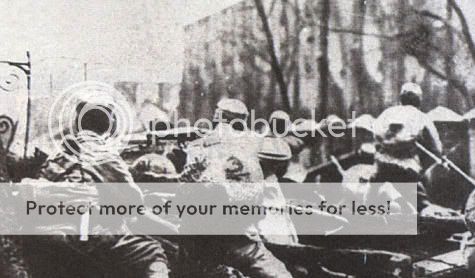
Soldiers of the 19th Route Army engaging in one of the final fire fights in Shanghai.
Taken from “The Rise and Fall of Imperial Japan”, by Christopher Lloyd, © 1985, Davidson Historical Books.
The aftermath of the Battle of Shanghai (1931) must also be discussed. This was essentially the first time Japanese soldiers had retreated from battle with Chinese soldiers and though small, its effects marked an important step in the militarisation of the Japanese government and the eventual path to its downfall.
The Japanese civilian government succeeded in negotiating with China, but at extreme cost to its own prestige. Prime Minister Araki, despite advocating an aggressive stance could see that securing Manchuria was a priority rather than being involved in an all out shooting war with the largest nation in Asia. His back stepping from what the militarists had seen as the correct course angered many of the more fanatical officers in the IJA and Araki would soon pay the price for his realism and negotiation.
After the agreed negotiation between the two countries, the Japanese civilian government was nearly at a standstill, Araki considered resigning but Baron Hiranuma Kiichiro convinced him that it was better for him to remain there to help control the more radical urges of the army factions. Several ministers did resign in protest at the agreement however and Jinzaburo Masaki pitched Araki to replace them with other members, but ones who shared Masaki’s views, so they would have even more power. The loss of these key military figures in the government caused such commotion in Japan, that for a while the war in Manchuria took a backseat in the newspapers to the government crisis. The political situation in Japan had finally reached a critical point and it would not be long before action was taken on the part of those who felt betrayed by Araki and the government.
The men who came into the government now, Heisuke Yanagawa, Tomoyuki Yamashita and Kuniako Koiso [3], were all part of Araki’s Imperial Way Faction, but not only that they were heavily intertwined into the radical secret societies that wanted to reshape Japan and destroy what they thought of as corrupt government form the bottom up and bring what the called ‘state socialism’ with more direct rule under the Emperor.
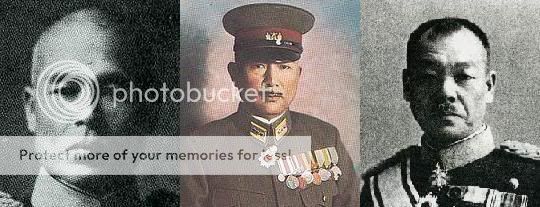
The new military figures in the Japanese government Yanagawa, Yamashita and Koiso.
[1] Araki was leader of the faction which advocated the ‘Imperial Way Faction’ which saw the Soviet Union as the biggest threat to Japan’s future.
[2] OTL Yoon assassinated General Yoshinori Shirakawa, commander of the IJA in Shanghai, during the battle of 1932. The earlier occurrence of the battle means he didn’t have the opportunity to get to Shanghai, so he targeted a general in Manchuria.
[3] With no Imperial Colours Incident, Koiso is still very involved in the Sakurakai and thus has become closer to the Imperial Way Faction than the Control faction.
16 August 1931
Tokyo
Empire of Japan
Prime Minister Sadao Araki let his hand barely touch the surface of the koi pond, the small fish darting away from the ripples his hand was making. He had a difficult decision to make and being in his small garden helped to calm his thoughts and sort things out clearly. Things had not been progressing well in the war. The Chinese had managed to stunt the Imperial Army at Shanghai and forced them to withdraw five months ago. Since then Manchuria and slowly come under control of the Imperial Army, but the losses were quickly mounting upwards. Guerrillas were picking away at the soldiers and the units were forced to march back and forth chasing the small groups of bandits.
It went against everything he believed, but he was seriously considering the offer that had been made by China via the League of Nations for a negotiated settlement. Not just himself, but everyone in his political faction and hundreds of army officers did not want to negotiate with China. But Araki thought that he could bring the Chinese to terms in an acceptable fashion. He would concede in some areas, but the one exception was Manchuria. That had to be Japanese, there was no question. Obtaining it was critical to the eventual war that with the Soviet Union that he knew was necessary.
He stepped back from the pond having made his decision. It was time to contact the League of Nations and start talking with the Chinese foreign minister.
Imperial Japan’s Folly: Invading China, By Marco Bravelli, English translation by Antonio Grimani © 1978, Gravello Publishing House-Kingdom of Italy, Nice
The failure of Japanese army to hold fast against the overwhelming Chinese forces led to a political and military stalemate in the Japanese government. The diminishing influence of moderate civilian government under Araki’s regime had led to much more radical military power. But that power had been shown to be mistaken after retreating from Shanghai and the attacks of the 19th Route Army. The military was self-deluded and did not want to admit that the attack on Shanghai was a mistake, but the few realists quickly realised, that an escalation into outright war was not in their best interest right now. Araki in particular was far more interested in securing Manchuria, which was become a meat grinder for the IJA. He had long looked towards the north and the threat of the Soviet Union and in his mind, securing Manchuria first was a necessary step in an eventual victory against the Soviets [1]. He was able to push through a ceasefire against the wishes of many in his faction, by arguing that they needed to focus on Manchuria instead of whittling away at Chinese cities. The attempted assassination of General Ueda Kenkichi in Shanghai by the Korean nationalist Yoon Bong-Gil in late August [2], helped to sway the reluctant officers that Manchuria and Korea were the prime areas for Japan to exert absolute control over, before gong to war with another nation. The Chinese were reluctant to sign a ceasefire, the ongoing fighting in Manchuria was very much in the public mind and was what had led to the anti-Japanese riots in Shanghai, but this problem was avoided as the ceasefire agreement only dealt with Shanghai and made no mention of NRA or IJA actions anywhere else.

Soldiers of the 19th Route Army engaging in one of the final fire fights in Shanghai.
Taken from “The Rise and Fall of Imperial Japan”, by Christopher Lloyd, © 1985, Davidson Historical Books.
The aftermath of the Battle of Shanghai (1931) must also be discussed. This was essentially the first time Japanese soldiers had retreated from battle with Chinese soldiers and though small, its effects marked an important step in the militarisation of the Japanese government and the eventual path to its downfall.
The Japanese civilian government succeeded in negotiating with China, but at extreme cost to its own prestige. Prime Minister Araki, despite advocating an aggressive stance could see that securing Manchuria was a priority rather than being involved in an all out shooting war with the largest nation in Asia. His back stepping from what the militarists had seen as the correct course angered many of the more fanatical officers in the IJA and Araki would soon pay the price for his realism and negotiation.
After the agreed negotiation between the two countries, the Japanese civilian government was nearly at a standstill, Araki considered resigning but Baron Hiranuma Kiichiro convinced him that it was better for him to remain there to help control the more radical urges of the army factions. Several ministers did resign in protest at the agreement however and Jinzaburo Masaki pitched Araki to replace them with other members, but ones who shared Masaki’s views, so they would have even more power. The loss of these key military figures in the government caused such commotion in Japan, that for a while the war in Manchuria took a backseat in the newspapers to the government crisis. The political situation in Japan had finally reached a critical point and it would not be long before action was taken on the part of those who felt betrayed by Araki and the government.
The men who came into the government now, Heisuke Yanagawa, Tomoyuki Yamashita and Kuniako Koiso [3], were all part of Araki’s Imperial Way Faction, but not only that they were heavily intertwined into the radical secret societies that wanted to reshape Japan and destroy what they thought of as corrupt government form the bottom up and bring what the called ‘state socialism’ with more direct rule under the Emperor.

The new military figures in the Japanese government Yanagawa, Yamashita and Koiso.
[1] Araki was leader of the faction which advocated the ‘Imperial Way Faction’ which saw the Soviet Union as the biggest threat to Japan’s future.
[2] OTL Yoon assassinated General Yoshinori Shirakawa, commander of the IJA in Shanghai, during the battle of 1932. The earlier occurrence of the battle means he didn’t have the opportunity to get to Shanghai, so he targeted a general in Manchuria.
[3] With no Imperial Colours Incident, Koiso is still very involved in the Sakurakai and thus has become closer to the Imperial Way Faction than the Control faction.
Last edited:
It's still alive
Allow me some time to go through the latest update.
I don't even have time to update my own TLDamn so busy these days!
Yep it is, I've been very, very slowly working on it, real life gets in the way like that, the trick is to do at least a little something each day, even just one paragraph, one map or one picture. Hoping to get my posts to one per month regularity.
Have been very much enjoying yours Tony, keep at it when you have time!
Hey, first person to mention this little change, yep Italy had somewhat of a different outcome than OTL. Never fear all shall be revealed during WW2, but it is ways of for now, still only early 1930sIf Nizza belongs to the Kingdom of Italy, Italy did somewhat better in the Alt World War ll. If Italy took Nice from France, who else was Italy fighting against? Whatever happened to Benny the Moose?
Hey, first person to mention this little change, yep Italy had somewhat of a different outcome than OTL. Never fear all shall be revealed during WW2, but it is ways of for now, still only early 1930s
NICE in the KINGDOM of Italy. Ya, some pretty big butterflies.
Share: